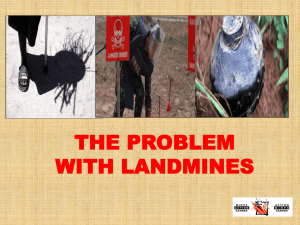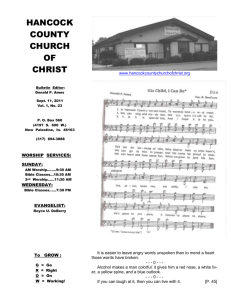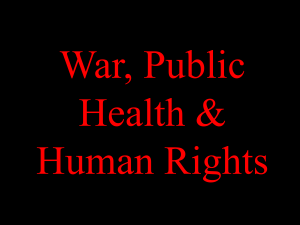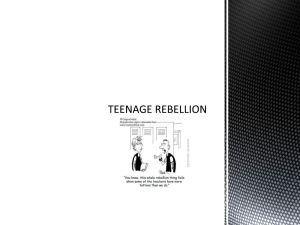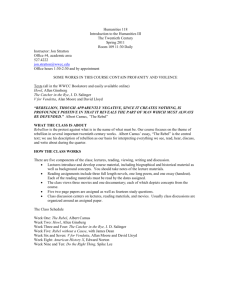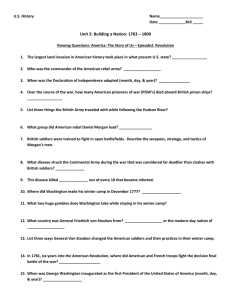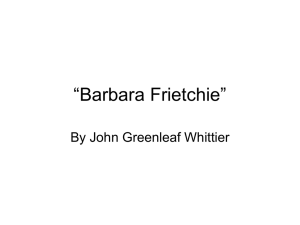tools or instruments for non-state armed groups - South
advertisement
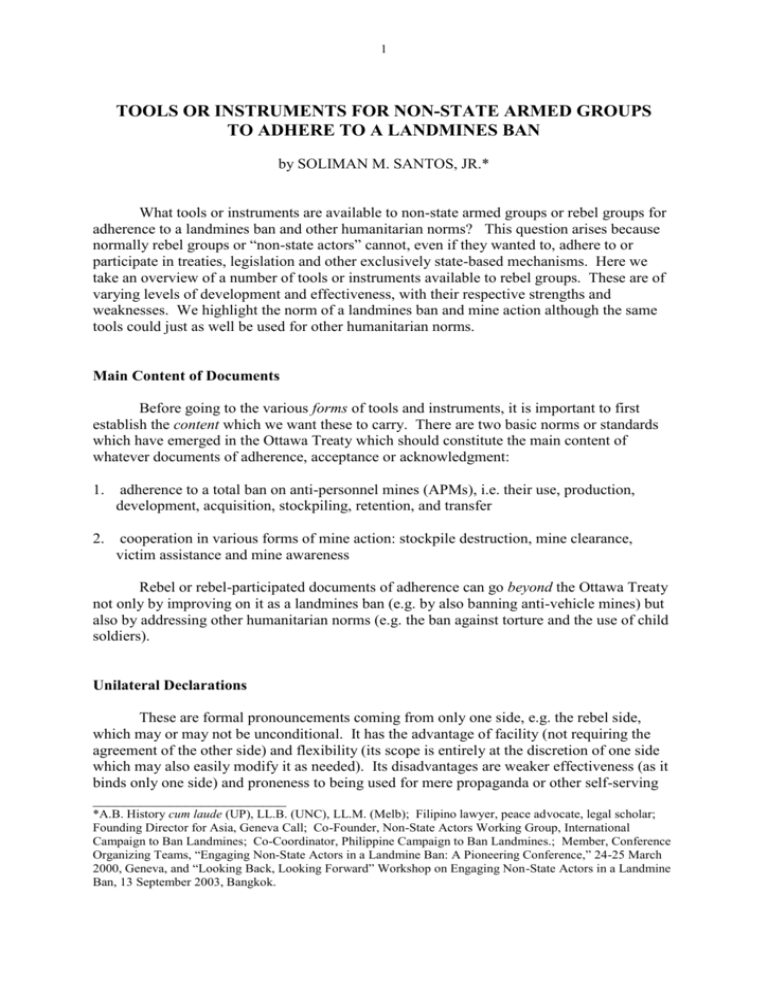
1 TOOLS OR INSTRUMENTS FOR NON-STATE ARMED GROUPS TO ADHERE TO A LANDMINES BAN by SOLIMAN M. SANTOS, JR.* What tools or instruments are available to non-state armed groups or rebel groups for adherence to a landmines ban and other humanitarian norms? This question arises because normally rebel groups or “non-state actors” cannot, even if they wanted to, adhere to or participate in treaties, legislation and other exclusively state-based mechanisms. Here we take an overview of a number of tools or instruments available to rebel groups. These are of varying levels of development and effectiveness, with their respective strengths and weaknesses. We highlight the norm of a landmines ban and mine action although the same tools could just as well be used for other humanitarian norms. Main Content of Documents Before going to the various forms of tools and instruments, it is important to first establish the content which we want these to carry. There are two basic norms or standards which have emerged in the Ottawa Treaty which should constitute the main content of whatever documents of adherence, acceptance or acknowledgment: 1. adherence to a total ban on anti-personnel mines (APMs), i.e. their use, production, development, acquisition, stockpiling, retention, and transfer 2. cooperation in various forms of mine action: stockpile destruction, mine clearance, victim assistance and mine awareness Rebel or rebel-participated documents of adherence can go beyond the Ottawa Treaty not only by improving on it as a landmines ban (e.g. by also banning anti-vehicle mines) but also by addressing other humanitarian norms (e.g. the ban against torture and the use of child soldiers). Unilateral Declarations These are formal pronouncements coming from only one side, e.g. the rebel side, which may or may not be unconditional. It has the advantage of facility (not requiring the agreement of the other side) and flexibility (its scope is entirely at the discretion of one side which may also easily modify it as needed). Its disadvantages are weaker effectiveness (as it binds only one side) and proneness to being used for mere propaganda or other self-serving _________________________ *A.B. History cum laude (UP), LL.B. (UNC), LL.M. (Melb); Filipino lawyer, peace advocate, legal scholar; Founding Director for Asia, Geneva Call; Co-Founder, Non-State Actors Working Group, International Campaign to Ban Landmines; Co-Coordinator, Philippine Campaign to Ban Landmines.; Member, Conference Organizing Teams, “Engaging Non-State Actors in a Landmine Ban: A Pioneering Conference,” 24-25 March 2000, Geneva, and “Looking Back, Looking Forward” Workshop on Engaging Non-State Actors in a Landmine Ban, 13 September 2003, Bangkok. 2 purposes. Be that as it may, a rebel group is bound by its own declarations and may be called upon to make good on its word. However, where there is a simultaneous or reciprocal unilateral declaration from the other side, it is as good as a mutual or de facto bilateral arrangement. Here are some examples of landmines-related unilateral declarations: 1. Sudan People’s Liberation Army (SPLA) Resolution on the Problem Posed by Proliferation of APMs in Liberated Parts of New Sudan, November 1996 Here the SPLA commits itself to a unilateral demining effort in the areas under its Control, and commissions a local NGO to demine the liberated areas. 2. National Liberation Army (ELN) of Colombia Public declaration reaffirming earlier commitment not to use landmines against civilians, July 1998 3. Somali Patriotic Movement (SPM) Banning landmines in Jubaland, September 1998 4. Taliban (Islamic Emirate of Afghanistan) Statement banning and renouncing “any use of any type” of landmines, October 1998 (This is one example of going beyond the Ottawa Treaty. It is also an application of the Islamic perspective on landmines. The Taliban is a “non-state actor” with is actually the de facto state for most of Afghanistan, a situation replicated in other countries.) 5. Polisario (Saharawi Authorities) Announcement of readiness to sign the Ottawa Treaty 6. Moro Islamic Liberation Front (MILF) of the Philippines Official Declaration on the International Campaign to Ban Antipersonnel Mines, March 2000 7. Revolutionary Proletarian Army (RPA) of the Philippines Declaration Against the Use and Production of Landmines, March 2000 (This is an application of the Marxist humanist perspective on landmines.) There are, of course, several examples of unilateral declarations by rebel groups, notably national liberation movements, adhering to international humanitarian law in general and the 1949 Geneva Conventions and 1977 Additional Protocols in particular. Bilateral Agreements These refer to agreements between the usual two sides to an internal armed conflict, the government and the rebel group. Such agreements are usually not limited to landmines but part of a broader peace or ceasefire agreement. In the long run, it is not enough to ban landmines; an end must be put to the war which gives occasion for using landmines. 3 Aside from being conflict-specific and country-specific (which is also the case with unilateral declarations), bilateral agreements have the obvious advantages of mutuality and reciprocity, which in turn enhance its effectiveness, more so with international monitoring. The international legal basis for bilateral agreements is the provision under common Article 3 of the Geneva Conventions encouraging special agreements between parties to armed conflict . Here are some examples of landmines-related provisions in bilateral peace or ceasefire agreements: 1. Provisions for location and destruction of booby-traps in the tripartite peace agreements/arrangements among the Communist Party of Malaya (CPM) and the Governments of Malaysia and Thailand, December 1989. (This resulted in joint mine clearance operations in the border area.) 2. Provision on clearing mine fields in the Sudan Peace Agreement between the Sudan government and the South Sudan United Democratic Salavation Front (UDSF), Sudan People’s Liberation Movement (SPLM), Equatoria Defence Force (EDF) and South Sudan Independents Group (SSIG), April 1997. 3. Provision on landminings as prohibited hostile act in the ceasefire guidelines between the Moro Islamic Liberation Front (MILF) and the Philippine government, November 1997. 4. Substantial provisions on landmines in the Comprehensive Agreement on Human Rights (HR) and International Humanitarian Law (IHL) between the National Democratic Front (NDF) and the Philippine government, March 1998. (This is another example of going beyond the Ottawa Treaty by addressing the landmines issue under the human rights, not just humanitarian, framework.) Memoranda of Understanding (MoUs) These refer to arrangements between rebel groups, on one hand, and international organizations and/or international/national NGOs, on the other, usually for humanitarian purposes. Some examples of MoUs on humanitarian standards, not necessarily on landmines are: 1. ICRC MoU/ Bosnia-Herzegovina, 1992 2. UNICEF Ground Rules/ Sudan (1995) This involves the participation of the SPLA and the local NGO, Operation Save Innocent Lives (OSIL)-Sudan 3. UN MoU/ Afghanistan (1998) 4. UN Principles of Engagement/ Democratic Republic of Congo (1998) A most recent example is the “MoU between the Government of Sudan, the SPLM and the UN regarding UN Mine Action Support to Sudan” of 19 September 2002. 4 Geneva Call Deed of Commitment This is a new independent international organization formed under Swiss law which calls upon rebel groups to commit themselves to a total ban on APMs and other humanitarian norms, and provides a new international mechanism for rebel group accountability for such commitments. It hopes to fill a gap in the international legal regime whereby rebel groups are, as a rule, not allowed to enter into or adhere to treaties such as the Ottawa Treaty. The possibility, remote or otherwise, for this treaty to be amended in the future (the soonest chance would be the 2004 review conference) to allow for such a participatory mechanism would be enhanced by an already existing mechanism, even if the product of another process. The initial mechanism is for rebel groups to sign a standard “Deed of Commitment for Adherence to a Total Ban on Anti-Personnel Mines and for Cooperation in Mine Action,” or to deposit their unilateral declarations subject to criteria. The venue and custodian for these deeds would be certain authorities in Geneva, the home of international humanitarian law. Initially, the authority is the President of the Council of State of the Republic and Canton of Geneva. The accountability provision in the initial “Deed of Commitment” binds a signatory rebel group to allow and cooperate in the monitoring and verification by Geneva Call and other independent international organizations and NGOs of its commitment to a total ban on APMs. This is understood to include periodic visits and inspections at the theater of armed conflict. This carries with it the rebel group’s obligation to provide the necessary information in the spirit of transparency and accountability. At the press conference launching of Geneva Call in March 2000, three rebel groups, the SPLA of Sudan, and the MILF and RPA of the Philippines, deposited their unilateral declarations (see above). More importantly, the latter two signed the standard “Deed of Commitment.” Its accountability mechanism is currently being tested with the MILF for apparent violations several months after. Unilateral declarations may be more expressive (and explanatory) of a rebel group’s adherence compared to merely signing on to a standard deed of commitment. But the latter has the advantage of being an international standard, and not only of adherence but also of accountability. The accountability mechanism cannot self-servingly come from the rebel group itself but must come from an independent, impartial and credible entity, which has to be of international stature because rebel groups are found in all continents. The legal “precedent” or “model” for the deposit of instruments is the deposit by national liberation movements of their declarations of adherence to the 1949 Geneva Conventions and 1977 Additional Protocol I, under Art. 96 (3) thereof. Multilateral Undertakings This would involve a conference or workshop of rebel group representatives to discuss and adopt legal and normative standards for armed conflict, including on landmines. This could result in something like a Rebel Code of Conduct, or a Rebel Protocol or Treaty. At the minimum, in such a meeting of rebel group representatives among themselves, those which have accepted a landmines ban can engage others in discussion on accepting the ban. 5 This may be a more effective path of persuasion since presumably rebel groups understand and communicate with each other better as fellow rebels with common rebel terms of reference. The closest legal “precedent” or “model” for something like this was the participation of national liberation movements at the 1974-77 Geneva Diplomatic Conference which produced the Additional Protocols. Mine-Free Zones These may range from local to regional although it may be more feasible and practical to have them at the local community level. While these may be effected by bilateral agreements, the ideal scenario is a trilateral dynamic where the third party is the local community which demands or even declares such zones (e.g. the peace zone experience in the Philippines). Part of the UNICEF Ground Rules in Sudan provided for “corridors of peace” and “zones of tranquility.” An initial concept paper on mine-free zones was made by the South African Campaign to Ban Landmines but this needs further development in theory and practice. The legal “precedents” or “models” for this are safety zones, neutralized zones, nondefended localities, and demilitarized zones under the Geneva Convention IV, Arts. 14 & 15, and Protocol I, Arts. 59 & 60, respectively. INDEED, international humanitarian law can stand further development in response to the challenges of present-day armed conflicts. This could include new tools or instruments to engage rebel groups in the practice and development of normative standards for such conflicts. # S.M.S. 4 VII 01 Atty. Soliman M. Santos, Jr. 18 Mariposa St., Cubao, QC PHILIPPINES Tel. (0063 2) 7252153, Fax 4138821 Mob. (0063 920) 2903602 Email: gavroche@info.com.ph
